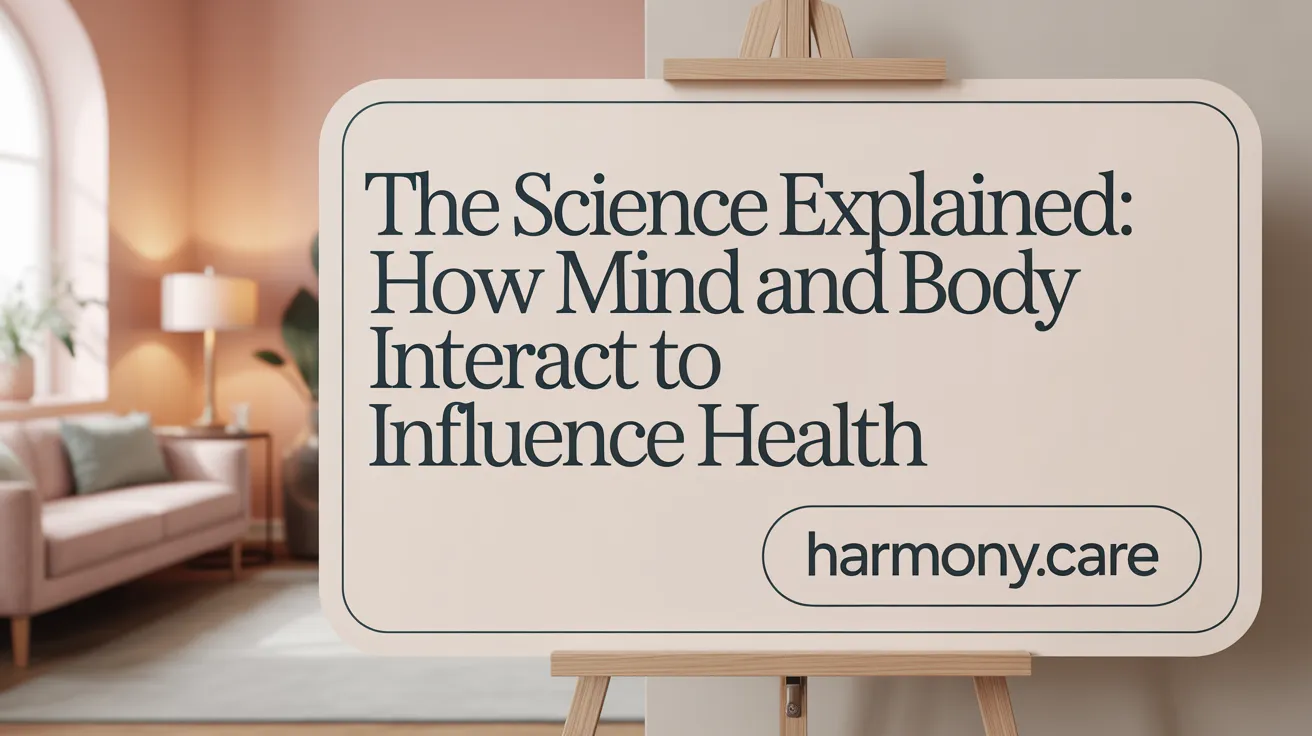Introduction to the Mind-Body Connection in Wellness
Understanding the Mind-Body Connection
The mind-body connection refers to the dynamic relationship between our mental and emotional states and physical health. It recognizes that thoughts, feelings, and attitudes profoundly influence biological functions such as immune response, hormone balance, and cardiovascular health. This bidirectional link means that mental well-being can affect physical health and vice versa, highlighting the importance of nurturing both for overall wellness.
A Historical and Scientific Perspective
This concept is rooted in ancient healing traditions like Greek philosophy and Traditional Chinese Medicine, which emphasized holistic balance and the flow of energy or "qi" for health. In modern times, scientific disciplines such as psychoneuroimmunology and neuroscience have validated these connections, illustrating how stress hormones like cortisol can impair immune functions, while positive psychological practices enhance healing and resilience.
Holistic Health and Wellness
Holistic health perspectives embrace the mind-body connection by treating the whole person—mind, body, and spirit—in pursuit of harmony. This approach encourages integrating natural therapies, mindfulness, balanced nutrition, physical activity, and emotional support to promote prevention, empower self-care, and facilitate the body's innate healing abilities. Through personalized, evidence-based care, holistic wellness aims to improve quality of life by fostering balance across all dimensions of health.
The Science Behind the Mind-Body Relationship

Physiological mechanisms connecting mental states and physical health
The mind and body communicate continuously through a complex network involving the brain, peripheral nervous system, endocrine, and immune systems. Mental states such as stress, anxiety, or joy trigger biochemical signals that influence bodily functions like heart rate, digestion, and immune responses. Neurobiological pathways facilitate this exchange, allowing emotions, thoughts, and beliefs to impact physical health.
Role of stress hormones and immune function
Stress activates the body's fight-or-flight response, causing the release of hormones such as cortisol and adrenaline. Chronic elevation of cortisol can lead to adverse effects, including high blood pressure, suppressed immune function, increased inflammation, and impaired healing. Conversely, reducing stress through relaxation techniques decreases cortisol levels, enhancing immune defenses and supporting overall wellness.
Psychoneuroimmunology and neurobiological pathways
Psychoneuroimmunology studies the interaction between psychological processes, the nervous system, and immune function. Positive mental states strengthen immune responses by promoting favorable neurochemical activity, whereas negative emotions like chronic stress and depression can weaken immunity. Key neural structures and signaling molecules—including neurotransmitters and the vagus nerve—modulate these effects, underpinning mind-body medicine.
Impact of positive and negative emotions on health outcomes
Positive emotions such as gratitude and optimism stimulate the release of beneficial chemicals like endorphins and oxytocin, improving mood, promoting healing, and boosting immunity. In contrast, persistent negative emotions can increase inflammation and contribute to chronic diseases such as heart disease and autoimmune disorders. Thus, cultivating emotional well-being is vital for maintaining physical health and longevity.
Mind-Body Practices to Enhance Wellness

What are the benefits of meditation, mindfulness, and breathwork?
Meditation, mindfulness, and breathwork are powerful mind and body practices that promote relaxation and stress reduction. These practices lower cortisol levels, helping to reduce inflammation and bolster immune function. Meditation encourages focused attention and breath regulation, improving emotional resilience and decreasing symptoms of anxiety, depression, and PTSD. Mindfulness enhances self-awareness and emotional regulation by fostering present-moment awareness, which can also improve sleep quality and reduce chronic pain.
How do physical activities like yoga, tai chi, and qigong support the mind-body connection?
Yoga, tai chi, and qigong combine gentle physical movement with mindful breathing and mental focus. These practices not only increase flexibility, balance, and muscular strength but also nurture emotional regulation and stress relief. Regular participation releases endorphins, natural mood elevating chemicals, which can alleviate depression and anxiety. Tai chi and qigong are especially effective in improving balance and physical stability while simultaneously calming the nervous system.
What therapeutic modalities complement mind-body wellness?
Therapeutic approaches such as acupuncture, massage therapy, and biofeedback further support the mind-body connection. Acupuncture stimulates nerves and connective tissues, releasing pain-relieving chemicals and improving circulation, which helps manage anxiety, chronic pain, and sleep disturbances. Massage therapy reduces muscular tension, improves blood flow, and decreases stress and anxiety. Biofeedback teaches self-regulation by providing real-time data on physiological functions like heart rate variability, enabling individuals to better control stress responses.
What evidence supports mind-body interventions for health?
Scientific research confirms that mind-body medicine effectively improves both mental and physical health outcomes. Studies widely support these interventions for managing chronic pain, anxiety, depression, PTSD, insomnia, and cardiovascular issues. Mind-body approaches activate brain regions involved in emotional regulation and suppress inflammatory pathways. For many conditions, such as arthritis, cancer-related symptoms, and autoimmune diseases, incorporating mind-body techniques enhances quality of life and reduces reliance on medications.
Incorporating these diverse mind-body practices into daily life offers a natural, personalized path to enhancing overall wellness by harmonizing mental, emotional, and physical health.
Holistic and Integrative Approaches in Women's Health

What is Holistic Wellness in Women's Health?
Holistic wellness embraces the interconnectedness of mind, body, emotions, and spirit to promote overall balance. It treats each woman as a whole person rather than focusing solely on symptoms. This approach empowers women through education, nurturing emotional regulation, and supporting spiritual growth alongside physical health. Mindfulness, meditation, yoga, proper nutrition, and connecting with nature are common practices that support this balance.
How Do Naturopathic and Functional Medicine Support Women’s Well-being?
Naturopathic medicine emphasizes the body's innate healing ability, using natural therapies like herbal medicine, diet, acupuncture, and lifestyle changes. Functional medicine complements this by identifying and addressing root causes such as hormonal imbalances, nutritional deficiencies, and chronic stress, tailoring interventions to the individual’s unique health profile. Both approaches prioritize prevention and personalized care, aiming to sustain long-term wellness.
How Are Mind-Body Techniques Integrated Into Personalized Care Plans?
Incorporating mind-body methods like yoga, breathwork, meditation, tai chi, and guided imagery enhances self-awareness, emotional resilience, and stress management for women. These techniques influence hormonal balance, immune function, and nervous system regulation. When included in tailored care plans, they help women better manage issues such as anxiety, depression, chronic pain, and menopausal symptoms.
Why Is Addressing Root Causes and Prevention Vital?
Holistic approaches focus on treating the underlying factors driving health concerns rather than just alleviating symptoms. This proactive stance supports prevention of chronic conditions and optimizes women's health outcomes. Lifestyle modifications, nutrition, stress reduction, and mind-body practices form the foundation of sustaining vibrant health through different life stages.
By blending natural therapies, mind-body integration, and personalized care, holistic and integrative medicine offers women a comprehensive pathway toward thriving physical, emotional, and spiritual wellbeing.
Stress Management and Emotional Resilience Through the Mind-Body Connection

How does stress affect bodily systems and contribute to chronic illness?
Stress activates the body's fight-or-flight response, leading to the release of hormones such as cortisol and adrenaline. These biochemical changes increase heart rate, blood pressure, and blood sugar, preparing the body to respond to immediate threats. However, when stress becomes chronic or prolonged, this constant hormonal activation can impair immune function, increase inflammation, and damage cardiovascular health. Over time, these effects elevate the risk for chronic diseases including heart disease, diabetes, autoimmune disorders, and mental health conditions like anxiety and depression. Additionally, stress can disrupt digestive, neurological, and endocrine systems, further undermining overall wellness (mind-body connection, effects of chronic negative emotions on health, Impact of Stress on Health, Effects of Stress on Immune Response, Impact of chronic stress on health).
What mind-body techniques help regulate the stress response?
Mind-body practices work by promoting relaxation and reducing stress hormone levels to restore balance between mental and physical health. Techniques such as mindfulness meditation, deep breathing exercises, progressive muscle relaxation, and guided imagery enhance self-awareness and emotional regulation. Physical activities like yoga, tai chi, and qigong combine mindful movement with breath control to calm the nervous system and reduce anxiety. Biofeedback and hypnotherapy provide tools to consciously influence heart rate, muscle tension, and brainwave patterns. Regular engagement with these practices helps elicit the "relaxation response," opposing the stress-triggered fight-or-flight reaction and improving immune, cardiovascular, and endocrine function (Mind and Body Practices, Meditation and Mind-Body Health, Mindfulness and yoga practices, Stress reduction through mindfulness, Mind-body medicine).
How can building emotional resilience and self-regulation improve health?
Strengthening resilience enables the body and mind to manage stress effectively and recover more quickly from adversity. Mind-body awareness enhances one’s ability to notice and modulate emotional and physiological responses before they escalate. Practicing meditation and mindfulness fosters greater emotional control, reduces mood swings, and lowers chronic stress levels. Emotional resilience also reduces the frequency and intensity of stress-induced physical symptoms such as headaches, muscle tension, and gastrointestinal issues. Self-regulation skills empower individuals to maintain calm and focus, buffering against the negative impacts of stress on the immune system and supporting long-term health (Mindfulness and meditation benefits, Emotional resilience techniques, Mindfulness practices, Mind-body medicine benefits, Mental, Emotional, Spiritual Well-Being).
What role does social support play in biochemical well-being?
Social connections are crucial for emotional and physical health, as they stimulate release of oxytocin, often called the "love hormone." Oxytocin enhances feelings of safety, reduces stress, and promotes social bonding, which in turn helps lower cortisol levels and inflammation. Strong social support networks are linked to fewer illnesses, faster recovery times, and increased longevity. Engaging with others in meaningful relationships, participating in group mind-body practices, or simply having empathetic support encourages biochemical changes that foster well-being and resilience. Cultivating social ties complements other mind-body strategies to create a holistic approach to stress management and health (Social support and oxytocin release, Healthy social connections, Role of social connections in emotional support, Benefits of strong mind-body connection, Mind-Body connection and resilience).
Spirituality and Purpose: Enhancing Wellness Beyond the Physical

How do mind-body-spirit interconnections enhance overall wellness?
Holistic wellness recognizes that mind, body, and spirit are deeply interconnected, each influencing the other to create a harmonious balance vital for true health. Emotional states affect physical processes, while spiritual well-being nurtures mental clarity and emotional resilience. By addressing all these components, holistic care promotes healing that extends beyond symptoms to the whole person.
What impact do spiritual practices have on mental and physical health?
Spiritual practices such as meditation, prayer, and connecting with nature support mental health by reducing stress, anxiety, and depressive symptoms. This stress reduction lowers cortisol levels, calming inflammatory processes and enhancing immune function. Spiritual engagement can foster hope, gratitude, and inner peace, which are linked to lower blood pressure and better cardiovascular health. For more on stress reduction through mindfulness and mindfulness and meditation benefits, see these resources.
How do purpose, connection, and environment contribute to holistic wellness?
Having a clear sense of purpose and meaningful social connections enriches emotional well-being, providing motivation and resilience through life's challenges. Supportive environments, including access to natural spaces and safe communities, nurture spiritual growth and mental calmness. These factors collectively strengthen the mind-body-spirit link and promote sustained health and quality of life, as discussed in holistic wellness care and mental-emotional-spiritual connections.
What are examples of spiritual and energy healing practices?
Practices like Reiki, Qigong, crystal healing, and shamanic journeying are used to balance energetic flow and support emotional and physical harmony. Aromatherapy, acupuncture, and sound healing also bridge energetic and physiological healing. Integrating these with medical treatments can foster deeper relaxation, spiritual growth, and overall wellness. Learn more about these mind-body connection techniques and holistic healing techniques.
By embracing spirituality and purpose alongside physical care, individuals cultivate a profound, personalized path to holistic health that honors their whole being.
Integrating Mind-Body Wisdom for Lifelong Wellness
Embracing the Mind-Body Connection
The mind-body connection plays a vital role in maintaining lifelong wellness. Research consistently shows that nurturing this harmony can reduce stress, improve immune function, and enhance emotional resilience. Practices such as mindfulness, yoga, and meditation not only calm the mind but also reduce inflammation and support heart health.
Incorporating Daily Mind-Body Practices
Integrating mind-body techniques into everyday life empowers individuals to take active roles in their health journey. Simple habits like deep breathing, guided imagery, or gentle physical activity can strengthen emotional regulation and decrease chronic stress. These natural approaches foster balance, helping to manage anxiety, depression, and physical ailments with fewer side effects.
Advancing Toward Personalized Holistic Care
Looking ahead, personalized medicine is increasingly incorporating mind-body therapies tailored to individual needs. This holistic approach blends conventional treatments with complementary strategies, considering each person's biology, psychology, and social environment. Emerging research supports precise, integrative care for improved health outcomes.
Empowerment Through Holistic Wellness
By embracing holistic wellness strategies, individuals gain tools to promote physical vitality, mental clarity, and spiritual fulfillment. Empowered with knowledge and self-care practices, people can foster enduring well-being and a higher quality of life that honors the interconnectedness of mind and body.
